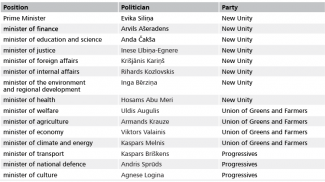Latvia: a new government led by Evika Siliņa
On 15 September, the Latvian parliament (Saeima) gave a vote of confidence to the government of Prime Minister Evika Siliņa: 53 out of 100 MPs were in favour while 39 voted against. The new cabinet will be formed by three political forces: the centre-right New Unity (Jaunā Vienotība, JV), the oligarch-backed Union of Greens and Farmers (Zaļo un Zemnieku savienība, ZZS) and the left-wing Progressives (Progresīvie, P). JV will hold the office of Prime Minister and seven ministerial portfolios, ZZS will control four ministries and name the speaker of parliament, and P will be in charge of three ministries. In addition to the members of these parties, the new government was also endorsed by the independent MP Oļegs Burovs.
It became necessary to form a new coalition after the previous cabinet led by Prime Minister Krišjānis Kariņš (JV) resigned on 17 August as a result of a coalition crisis that had been ongoing since late May. JV’s partners, the National Alliance (Nacionālā apvienība, NA) and the United List (Apvienotais saraksts, AS), did not support JV’s candidate Edgars Rinkēvičs in the presidential election. He was elected with the support of ZZS and P, which were in opposition at the time. Following this incident, Kariņš decided to overhaul the governing coalition by expanding it with new partners. Negotiations with various parliamentary factions lasted for more than three months, but in the end proved fruitless. Finally, on 11 August, members of NA and AS rejected the Prime Minister’s ultimatum on policy issues and changes in ministerial positions and the coalition broke up.
The new cabinet’s priorities include passing the budget law for next year and completing a protracted series of socio-economic reforms, especially those relating to education, funding for health care and the expansion of the country’s road infrastructure. The coalition has also pledged to slash the high energy tariffs and bring down borrowing costs. Furthermore, it intends to ratify the Istanbul Convention and adopt a law on civil partnerships.
Commentary
- The new governing configuration that supports Prime Minister Siliņa appears to be an ad hoc alliance to carry out concrete reforms. It is unlikely that this cabinet will survive until the end of the current parliamentary term in 2026. This is also evidenced by the less than ideal relations between the coalition partners. Over the summer JV and P clashed in the capital city’s council: the centre-right ousted the P-backed mayor of Riga and installed a former deputy mayor from JV in the post. Relations between ZZS and JV cannot be described as good either; the two parties have jointly formed governments on several occasions, but in recent years JV has ruled out further cooperation with ZZS. The reason given is that the controversial oligarch Aivars Lembergs, who is subject to US sanctions, has worked under ZZS’s banner.
- Paradoxically the current political arrangement, where JV holds all the most important positions (prime minister, president, mayor of the capital), will pose a major challenge for the head of government and her party. On the one hand, it should be much easier to take political decisions, but on the other, she and her party will be solely blamed for any failures or inefficiencies.
- Reforms in education and health care are extremely urgent and have been promised for months. The public health sector has been grappling with a prolonged financial crisis, as a result of which even the country’s largest facilities may go bankrupt. Latvia has also seen regular protests by medical staff. In practice, the continued implementation of changes in public education means the further optimisation of the school network; in effect, that means the closure or merger of municipal facilities with low numbers of children.
- The proposed social and civic reforms have already been debated several times. So far, the ratification of the Istanbul Convention and the legalisation of civil partnerships have met with resistance from the conservative part of the Latvian political scene and society. In the current coalition arrangement, NV and P are clearly in favour of both these proposals. On the other hand, ZZS has made its attitude towards these changes conditional on their constitutionality. At the same time, both proposals appear to be far more important as elements of the country’s foreign policy (building a positive image) than as measures designed to meet the expectations of the majority of the Latvian people.
- The new cabinet’s pro-European and pro-Atlantic course in foreign and security policy means that the work of the two previous NV governments will be continued. The former prime minister will become the head of diplomacy. P will take over the defence ministry, which will be headed by the former director of the Latvian Institute of International Affairs, Andris Sprūds, who speaks fluent Polish and holds a PhD in political science from Cracow’s Jagiellonian University.
APPENDIX
Biographical note on the new Prime Minister
Evika Siliņa (born 1975) has been active in politics since 2011. She started her career in the now-defunct Reform Party and later joined Unity/New Unity. She failed to win a parliamentary seat on several occasions before finally succeeding in the 2022 elections for the 14th Saeima. She has held advisory positions for most of her political career. Over the years, she has worked closely with Rihards Kozlovskis and, since 2019, with Kariņš. She served as parliamentary secretary to the Prime Minister in the latter’s first government (2019-2022) and was minister of welfare in his second government, which was formed after the most recent parliamentary elections in 2022. Before entering politics, she ran a private law practice from 2003 to 2012. She received her legal education at the University of Latvia and the Riga Graduate School of Law. She speaks fluent English and Russian. She is married with three children.
Composition of Evika Siliņa’s coalition government






